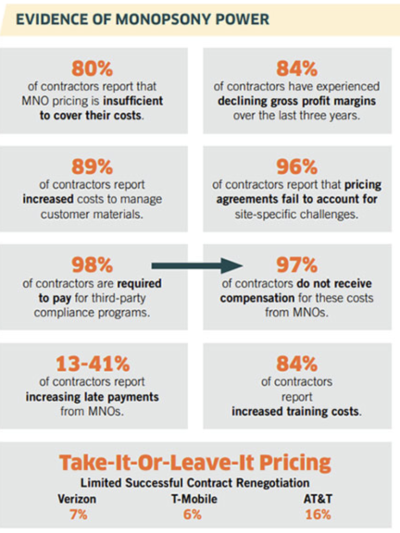Labor issues in the tower industry are nothing new, but a new report from The Brattle Group warns the underpinning economic model of the tower industry is unraveling.
The essential tower technicians that deploy and maintain the infrastructure are being squeezed by a market that Brattle and the National Association of Tower Erectors (NATE) are calling a monopsony: a few big buyers controlling a sea of sellers.
In telecom, those buyers are ‘the big 3’ — carriers Verizon, AT&T and T-Mobile. Brattle’s data found that matrix pricing is keeping labor compensation flat — and in some cases lowering it — despite the technical complexity of the work increasing.
The result: 84% of infrastructure contractors report declining gross profits, with many taking underpriced jobs just to stay on bid lists. More than half have reduced their workforce in the past three years.

In a media briefing on the report, NATE CEO Todd Schlekeway noted some contractors were not renewing with them or pulling out of the industry all together, increasing the association’s growing concern alongside its the report findings.
Brattle principal Paroma Sanyal warned on the call, "It's just not a business issue either, it’s actually a fairly important national security risk because tower climbers and infrastructure workers are highly skilled and they're not easily replaced.”
That strain doesn’t just slow routine maintenance — it risks leaving critical systems vulnerable when this workforce is needed most.
"Think about national disasters, or even national security incidents, when this workforce might have to be called upon at a moment's notice. If you have a market structure that's not building up this workforce, where this workforce is exiting the industry, where these infrastructure companies are exiting the industry, this is going to create a very deep national security issue," she continued. “So, I think the cost of inaction in this space is not just economic, it's much more strategic.”
Yet while the workforce is thinning, the volume of tower work could soon surge — particularly through federally backed broadband programs like the Broadband Equity Access and Deployment (BEAD) program.
With the BEAD program’s overhaul favoring wireless technology, more work is imminent. With the big 3 expanding their fiber footprints and dominating 97% of the wireless market, they’re positioned to win a sizable portion of BEAD-era contracts. Although not subject to the "take it or leave it" pricing model used by carriers, those contracts will still rely on a healthy workforce.
According to Schlekeway, Brattle’s report adds quantitative reinforcement to ongoing negotiations NATE has already been having with the big 3 — who had asked them to “provide evidence” beyond industry anecdotes to support their warnings.
Support for negotiations with the Big 3
NATE is using the new report as a stat-backed bargaining tool with the three carriers, and as evidence to hopefully educate government agencies and members of Congress. While they mentioned the possibility of an FCC filing on the call, their current focus remained on broader awareness.
“We need to continue to press the levers of the government agencies that have jurisdiction over our industry, and that includes the FCC,” said Schlekeway. “But the first order of business is making sure that this report is seen by the masses in DC... I think that's our immediate next step.”
NATE has been in the process of forming working groups with each of the big 3 carriers to support improved contractor practices.
Currently, they have framework agreements in place with Verizon and T-Mobile to assist contractors, with sessions underway at Verizon and set to begin with T-Mobile in August. Negotiations with AT&T are ongoing and expected to wrap up within the next month.
One of NATE’s co-founders Craig Snyder, noted on the call that the report and their pursuit was not meant as a “poke in the eye” but rather evidence to convince C-suites on the value of these framework agreements.
Still, Snyder described the contracting behavior from the big 3 to be “a bottom-line exercise for shareholder value." He added "But in my opinion, at the end of the day, they're not looking at the long-term benefit of maintaining a workforce.”
Climbers over carriers?
Despite the push to highlight how big carriers conduct subcontracting in tower building and maintenance, Tommy Schuch said there's not enough focus on the climbers directly affected by this unraveling economic model.
Schuch, a climbing veteran and documentary filmmaker, recently formed Climber Protections Group (CPG), a not-for-profit organization focused on unifying, protecting and advocating for the tower technician workforce.
“While the workforce is casually acknowledged, there’s no real strategy to protect or uplift the people doing the climbing,” he told Broadband Nation. “The report points to a ‘crumbling economic model,’ but the solution seems aimed at shielding the top, not addressing the systemic issues that put workers at risk every day.”
Indeed, the report extensively details the impacts of a monopsony on wages, but both the document and the briefing were more focused on the macro-economic market structure and the impact on contractors than the specifics around climber conditions.
The only suitable support is enforced federal regulation, “not voluntary guidelines. Actual oversight,” Schuch argued. “Because as it stands now, there’s no one holding these companies accountable when corners are cut and lives are lost.”
“[Carriers] have teams of lawyers and lobbyists protecting their interests. Tower climbers don’t,” he concluded.